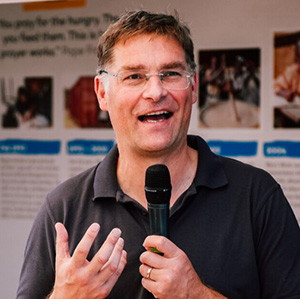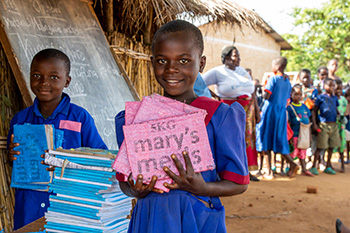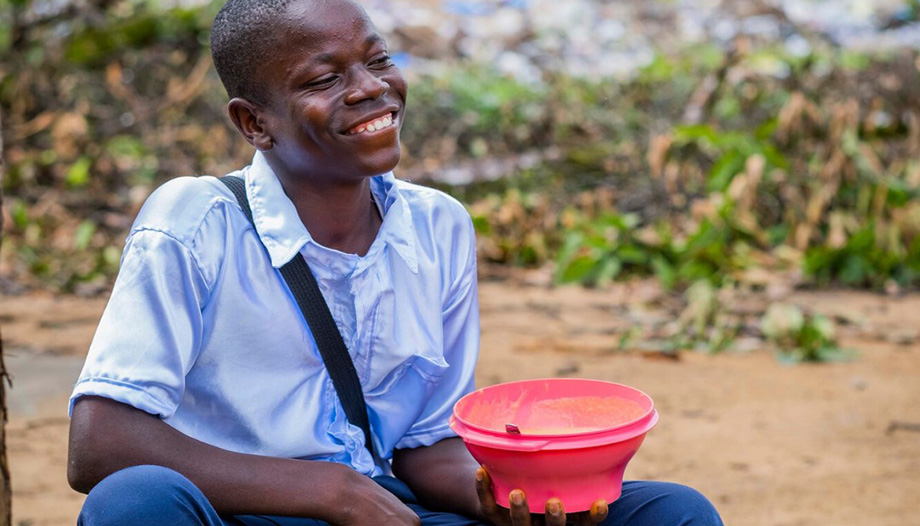A few weeks ago, Magnus MacFarlane - Barrow visited Spain to talk to the students of the Francisco de Vitoria University to raise awareness of Mary's Meals and its fight to end hunger in the world.
18 euros is what it costs to feed a child every school day for a year and this NGO, linked to the protection of the Virgin Mary and the Shrine of Medjugorje, distributes, through its volunteers, more than two million meals in schools, educational centers, prisons or migrant centers.
In this interview with Omnes, Mary's Meals founder Magnus MacFarlane-Barrow emphasizes how "Mary's Meals is a beautiful opportunity to be apostles of love and Our Lady continues to invite us to be apostles of love".
How and why was Mary's meals born?
-In 1992, my brother and I launched an appeal to help those suffering from the atrocities of the Bosnian war. The impetus of this appeal led me to set up a registered charity, Scottish International Relief (SIR), where we worked for ten years. Over those years, we did a lot of work in Romania with HIV-positive children, and also in West Africa and Liberia during their civil war: lots of different things and lots of different situations, but no real focus.

The Mary's Meals global campaign was born in 2002, when I visited Malawi during a famine. We were running very simple emergency feeding programs, taking food from the cities to the villages. While we were doing that, I met a family that had a huge impact on me and really sparked the birth of Mary's Meals. They lived in a two-room mud hut, the father had been dead for two years and the mother was dying of AIDS, lying on the floor with her children around her. I started talking to the oldest son, Edward, and asked him what his dreams in life were. Edward replied simply, "To have enough food to eat and to go to school someday."
Edward's response was something we had encountered time and time again, working in the poorest communities in the world. We were continually encountering children who were not going to school because of poverty. And it has been proven, time and time again, that a basic education for all is the key to lifting the world's poorest communities out of poverty. Her words brought this reality into focus and Mary's Meals became a simple answer to this situation.
We are convinced that Mary's Meals is not just an idea but something that we have seen really work.
Mary's meals is supported by thousands of volunteers who make donations that go almost entirely to food and emergency projects. How is an NGO like this managed? Where do your volunteers come from?
-Mary's Meals' work is made up of many small acts of love, and we rely on thousands of volunteers every day to make our program a reality.
Our school feeding programs are owned and managed by the local communities in the countries where we operate.
Magnus MacFarlane - Barrow. Founder of Mary's Meals
The whole model is based on the idea of local ownership. Our school feeding programs are owned and managed by the local communities in the countries where we operate. And it is important that volunteers in those countries have the opportunity to take ownership of the program and learn from the experience, so that they can lead the way in supporting education and school feeding in their own environment.
Sometimes in humanitarian aid there is a danger that those of us in the richer countries are the givers and those in places like Africa and India are simply passive recipients of our aid. At Mary's Meals this is not the case at all. It's about mutual respect and local ownership of the project, where a lot of people from all over the world walk together with the same goal. Whether it's the people in the West who give the money to buy the food or the people in Malawi who get up early in the morning to light the fires to cook the food that is served, we are all united in that same mission.
Mary's Meals makes reference to the Virgin Mary, in fact, Christ is the food of all souls, how has your Christian vision of life influenced this task?
-Mary's Meals is a Madonna project from the beginning. She takes care of it. We carry the name of Mary, the mother of Jesus, who educated her own son in poverty. I think Mary's Meals is a beautiful opportunity to be apostles of love and Our Lady continues to invite us to be apostles of love. Anyone in any situation can be part of this mission, and that is one of the things I love so much about Mary's Meals. With your help we are feeding more than two million children every school day in 20 countries.
The southwestern city of Medjugorje, in Bosnia and Herzegovina, remains absolutely the center of this beautiful project that is growing all over the world. We have an information center in Medjugorje, so many pilgrims who come here meet Mary's Meals. Today, we have Mary's Meals organizations in 18 countries that exist for the purpose of raising awareness and funds and most of those organizations have been born through people discovering Mary's Meals in Medjugorje.
Most of our organizations have been born through people discovering Mary's Meals in Medjugorje.
Magnus MacFarlane - Barrow. Founder of Mary's Meals
Faith, the Gospel and Medjugorje are at the center of my life. The starting point of everything I do is to pray and try to live Our Lady's messages. It's not about going out and doing things, it's about doing what Our Lady asks every day. Then, perhaps, God will call us to do other things.
I continue to be inspired by my Catholic faith and my experience over the years doing this work has strengthened my faith again and again, seeing God's providence at work. When we have needed something to keep feeding the children, God has always provided.
Mary's meals relies on volunteers from many different backgrounds. How can you support Mary's meals campaigns?

-Our mission is to enable people to offer their money, their goods, their skills, their time or their prayers and, through this participation, to provide the most effective help to those suffering the effects of extreme poverty in the world's poorest communities.
Without passionate and motivated volunteers, Mary's Meals cannot function. We are a global grassroots movement, and an intrinsic part of our work is to involve as many people as possible, recognizing that each has a unique role to play in this mission.
This incredible movement has grown around the world. We are getting more and more support from companies that do all kinds of creative things. We get support from foundations. Those large donations help us accelerate and move forward. But most of all, we're building a grassroots movement of many, many people who make more modest donations, people who give us that amount of money to feed a child for a year.
As the nature of our intervention is medium to long term and we intend to walk alongside these communities for several years, we believe that building this grassroots movement is the key to enable us to make that promise, to walk with them, until the time when we are
My experience of these years doing this work has strengthened my faith again and again, seeing God's providence at work.
Magnus MacFarlane - Barrow. Founder of Mary's Meals
Do you think that society has been gaining in solidarity in recent years or, on the contrary, have we become "accustomed" to seeing scenes of hunger in the world?
-Unfortunately, when we look at the world today, it's not good. After decades of progress in the fight against world hunger, we are going backwards in a horrible way. Millions upon millions of people falling into chronic hunger. Millions of children facing a new hunger in this world.
There are an estimated 75 million children, like Edward, who need school meals. More than 58 million of them are out of school and many more are in school, too hungry to learn. If we are serious about creating a sustainable solution to world hunger, that's where we need to start - we can't pass these children by.
What kind of sustainable future is there if children don't go to school, if they don't eat, if they can't grow and develop and be the people they are meant to be? In the countries where we are already working, there is a lot more to do, not to mention the countries that are still waiting. So there is no lack of work to be done.









